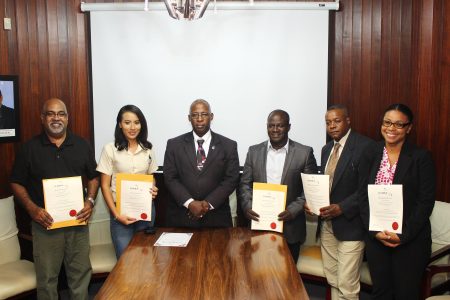Five radio broadcasters, who have demonstrated full compliance under the 2011 Broadcasting Act as of 31st December, 2016, were yesterday presented with licences and Chairman of the Guyana National Broadcasting Authority (GNBA) Leslie Sobers said the move paves the way for the enforcement of the recently-amended legislation.
“This presentation is to bring things back on even keel because some of these licences were not issued. There are reasons for that. It is public knowledge that the board was going through a trying time and there was a transition taking place between the previous board and the new one and so licensing was not done and what we are trying to do now is to bring things back to normal…so that we can move forward with some degree of smoothness for 2017,” Sobers explained, shortly after signing and handing out the licences to National Television Network Radio Inc., iRadio Inc., National Communications Network (NCN), Wireless Connections and Radio Guyana Incorporated.

The presentations were made at GNBA’s Lamaha Street office.
Noting that a decision was taken to start with radio braodcasters just to “kick start” the process, Sobers, an attorney, said that 2016 licences will be issued to television and cable broadcasters next week. “…That will bring everyone up to speed as at the end of 2016 and then we will turn our attention to 2017,” he said.
Sobers told the gathering that licences are still to be issued for 2017 and this will be approached with a little care. “As you know, the [Broadcasting] Amendment [Act] was assented to on the 7th of September and came into law on the same day and that new Act, which amends the 2011 Act, has some provisions in it that were not there before,” he said while citing zoning as one example.
He added that with the presentation of the 2016 licences, the Authority will now have to determine how the licensing for 2017 will be done. “So are we going to prorate from January to September under the old Act and then September to December under the new Act or are we just going to use one fee for 2017 and start fresh from 2018. Those are the two considerations before the board that we will decide on at our next board meeting. We have been discussing it. We will continue to discuss it, come to a final position and then move towards licensing for 2017 once we have agreed on that,” he explained.
Sobers also used the occasion to seek to assuage concerns concerning the new Act. “I can safely say that nothing we are doing here is intended to violate any constitutional right. We are not hindering anybody’s freedom of expression… to receive information or to disseminate information,” he said, while noting that some of the broadcasters getting 2016 licences were among those who had expressed doubts about the new Act. “We have some of them here. So, I trust that this signing would allay the fears. We will only look at persons who are in violation of the Act, who have failed to comply and those would be our guiding principles in accordance with the regulations which are now part of the Act as scheduled and if persons are in violation we will deal with that accordingly,” he added.
All broadcasters were required to reapply for licences following the enactment of the Broad-casting (Amendment) Act on September 7.
The new law required all radio and television broadcasters to apply for licences within 30 days of the amendments coming into force, failing which they faced immediate closure of their operations.
The law says broadcasters who fail to apply for licensing or are rejected by the GNBA shall immediately halt operations or they would be guilty of an offence, for which they could face a one-year prison term, a fine of $1 million and the forfeiture of all their equipment.
The amendments were met by strong objections from the opposition as well as several broadcasters, and local and regional press bodies.




